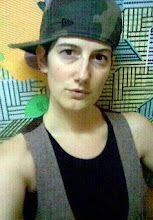Today was my first day as a volunteer facilitator for Bridge The GAP (Girls Advocacy Program), which links adult women in prison with young women in the juvenile justice system through writing.
The program is located within the confines of the Dade County Correction Prison in Homestead, Florida (about a 45 minute drive from my house), and is led by a former felon – who now sits on the governor’s ex-felon watch dog task force – as well as two other women who have used creative means to advocate on behalf of those with no voice.
I got to the command post for the women’s prison at 8:15 a.m., met my fellow facilitators and went through various super secure-locked doors, bag checks, and identification documentation before we got to a small classroom and met the 15 women taking part in the 13-week project.
After arranging the chairs into a circle, I introduced myself as a young person who is committed to abolishing social injustices that further marginalize women, criminals, young people, and minorities. I told them how as a journalist, and now studying to get my master’s in social work, it is my hope to expose to the world the demonization that continues in our world/media in regards to people behind bars. Further, I reminded them that as humans we all deserve a voice, and despite the common misconception, these folks are more than just numbers, they are wonderful, delicate, intellectual, funny, distraught people, who are often a product of an environment that lends to problems out of their control.
On my left sat a 31-year-old who came to Florida on vacation seven years ago, and never left. And while there were no details on the crime during today’s two-hour session, she was convicted of vehicular manslaughter and will sit in a cell for the next 38 years. On my right, a bright woman, who was commended for her writing skills in the past, is sitting on a double life sentence.
At least ten others in the room are facing life in prison – some for first-degree murder, others for aiding in a crime; and even more may never get out because of an inadequate parole board system that does not look enough at the environment the women come from (many have been sexually abused day, after day, after day as children). And while many think 25-to-life means a quarter of a century behind bars, the women present at today’s meeting said that the powers-that-be never look at behavior until at least the second parole meeting, which usually comes about 35 years after the inmate was convicted of a crime. The percentages are slim to none.
The population of women in prison has been on the rise throughout these past years, and one way to curb the numbers is to stop young women from ever reaching the adult circuit. BGAP hopes that by having the adults pour their hearts into significant, moving tales about their lives in the big-house, which later will be performed via interpretive speech and dance to the girls, they may cut down the recidivism rates, and let these girls know they still have a chance.
It will be my job, as a writer, to take these stories and create journalistic articles by cutting out the fat in the pieces, making them objective and forthcoming, and sticking to one point (what ever that may be).
Many of these women were locked up before they themselves could have children and, for some, the last 25 years in confinement have allowed them to reach inside of themselves, revisit their crimes, experience anger, remorse, sadness, etc. They are now ready to share their experience with a generation between the ages of 10 and 17, who are mostly first-time, yet violent, offenders, with family and individual histories of abuse, and mental illness.
As these women reflected on their sentences, I felt their sadness and pain. What would it be like to serve life in jail? What would it be like to think about the one incident that forever cast you as a monster in the eyes of the general public? Have we not all made decisions that if only cranked in one direction or another, could have landed us in jail, dead, or on another path? The stories that have yet to come from this amazing group of women will be both devastating, and uplifting.
I look forward to the next 13 weeks, where each Monday I will face the challenge of generating story ideas to share with the world through media, while at the same time being a trusted friend to these folks. I hope to be there for them, because let's face it, the institutionalized system was not set up to be sympathetic, especially not to women (who are already marginalized in society) who have committed crimes, and stem from poverty-stricken communities and families, have little to no education, and who are "acting outside of set mold" of demur feminine.
skip to main |
skip to sidebar

Please don't stand still, we must continue to ask questions, seek truths, love ourselves and others...even if this means finding out negative, uncomfortable notions. As one quote states,"Don't lose hope; when it gets darkest, the stars come out."
Sexism is a social disease. ~Author Unknown
About Me

- Social Justice Feminist
- I am a feminist. I am a sister. I am a daughter. I am a granddaughter. I have my undergraduate journalism degree from the University of Southern California.I hold a master of social work degree from Columbia University. I dissect communication, and interpret meanings through intensity. Honest and open words move me.
Sexism is a social disease. ~Author Unknown